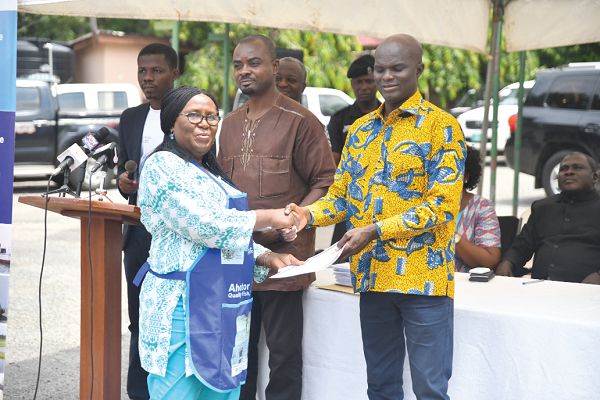
Certification of fish processors, traders initiative launched in Accra
An initiative to certify fish processors and traders to improve the quality of fish in markets in the country and for export has been launched in Accra.
Known as Class One Recognition Scheme for fish processors and traders, it lays out minimum standards for hygienic processing of fish and also provides the Fisheries Commission a platform to train small-scale fish processors on value-added production livelihood improvement.
It forms part of a Sustainable Fisheries Management Project (SFMP) that was rolled out by the United States Agency for International Development (USAID) in collaboration with the Fisheries Commission.
The programme, which is the first of its kind in the country, is also expected to improve market access and income to more than 2.5 million fishers and fish processors along the fisheries value chain in Ghana.
And as part of the scheme, 1,500 processing ovens will be distributed to fish processors before the year ends to ensure that fish smoking was carried out in an environmentally friendly manner.
How to qualify
To qualify for recognition, a fish processor would have to acquire fish smoking ovens known locally as ‘ahotor,’ ‘FTT’ among others, undergo training on healthy fish handling before applying directly to respective zonal fisheries officers.
The zonal fisheries officers and district healthy fish committees would then conduct an internal audit of the processing facility with the help of a certification checklist developed by multi-disciplinary stakeholder committees and present a report through the Regional Director of Fisheries.
The Director of Post-Harvest of the Ministry of Fisheries, Mr Samuel Manu, said if the facility met the required certification standards, a recognition status would then be awarded the fish processor.
He said it would also make it easier for Ghana to export processed fish to foreign markets since it would have met global phytosanitary standards.
The Ministry of Fisheries will be responsible for the provision of Class One certificates and healthy fish labels (stickers) to successful candidates.
The checklist includes good scores in environmental hygiene, layout of premises, personal hygiene, water quality, storage, pest control, cleaning programme and waste management.
The rest are packaging, transportation, record keeping, recall and traceability, which makes it easy to trace fish on the market in the event of food poisoning and other mishaps.
Challenges
Experts say poor product quality and unhygienic handling practices are major concerns in the local fish processing industry. Microbiological contamination can occur at multiple points through the value-chain, processing, storage and sales of fish in poorly kept and unhygienic surroundings.
According to the Fisheries Ministry, one of such contaminants was the Polycyclic Aromatic Hydrocarbons (PAH), which was introduced onto the fish during smoking.
Its research indicated that fish smoked with the traditional Chorkor oven contained PAH levels, seven to 10 times higher than the European Union standard (BaP2: PAH 12).
In that regard, the Deputy Minister of Fisheries and Aquaculture Development, Mr Francis Kingsley Ato Codjoe, said there was the need to pay more attention to current smoking and drying techniques to significantly improve on small-scale fishers’ livelihoods and also respond effectively to product safety challenges.
Mr Codjoe further advised fish processors not to patronise fish from farmers who use DDT, dynamite and light.
USAID
The USAID/Ghana Deputy Mission Director, Mr Steven E. Hendrix, observed that processors could work in a clean and hygienic environment.
He encouraged the use of the ahotor ovens which he said reduced harmful smoke emissions and would, therefore, protect the health of processors, their families and communities.
For her part, the President of the National Fish Processors and Traders Association, Ms Regina Solomon, expressed appreciation for the initiative which, she observed, would benefit fish processors significantly.
